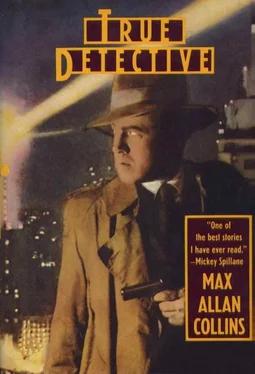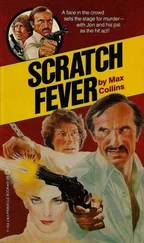Max Allan Collins
True Detective
He felt like somebody had taken the lid off his life and let him look at the works.
— Dashiell Hammett
1
The Blind Pig
December 19 — December 22, 1932

Frank Nitti
I was off-duty at the time, sitting in a speak on South Clark Street drinking rum out of a coffee cup.
When two guys in topcoats and snap-brim hats came in and walked over without crawling out of ’em, I started to reach for the automatic under my jacket. But as they neared the table, I recognized them: Lang and Miller. The mayor’s bagmen.
I didn’t know them exactly, but everybody knew them: the two Harrys — Harry Lang and Harry Miller, the detectives handpicked by Mayor Cermak to handle the dirty linen. Lang I’d spoken to before; he was a guy about ten years my senior, thirty-seven or eight maybe, and a couple of inches under my six feet, a couple pounds over my 180. He had five-o’clock shadow and coal black hair and cold black eyes and the sort of shaggy eyebrows you don’t trust; even the impression of hair was a lie: under the hat his forehead kept going. Miller was forty and fat and five eight, with a blank face and blanker eyes — the kind you can take for stupidity if you aren’t careful. He was cleaning off the lenses of his wire-frames with a hanky, the glasses having got fogged up in the cold. His ears stuck out; when he put his glasses on, they stuck out more. The Coke-bottle lenses magnified the blank eyes, and it struck me he looked like an owl — an owl that could kick the crap out of an eagle, that is.
Before he was a cop, Miller was a bootlegger — one of the Miller Gang, who were West Side Boys. That made it Old Home Week: we were all West Side Boys. Maxwell Street, where my father’s stall had been, was where I knew Lang from.
But I didn’t know Lang well enough to merit the old-drinking-pals camaraderie he suggested in his words if not his tone: “Hiya, Red. Heard you hung out here.”
Red wasn’t my name. Heller was. Nathan Heller. Nate. Never Red, despite my mother’s reddish-brown hair I was carrying around.
“The joint’s halfway between Dearborn and LaSalle Street stations,” I shrugged. “It’s handy for me.”
It was around three in the afternoon, and we had the place pretty much to ourselves: just me, the mayor’s front-office dicks, the guy at the door, the guy behind the bar. But it was a cramped, boxlike joint with lots of dark wood and a mirror behind the bar and framed photos everywhere: celebrities and near-celebrities, signatures on their faces, were staring at me.
So were Lang and Miller.
“Buy you a cup of coffee?” I said, rising a little. I was a plainclothes officer, working the pickpocket detail, bucking for detective status. These guys were the best-paid detectives in town, sergeants yet, and they maybe didn’t deserve respect, exactly, but I knew enough to give them some.
They made no move to sit down. Lang just stood there, hands in his topcoat pockets, snow brushing his shoulders like dandruff, and rocked on his heels, like a hobbyhorse; but whether it was from nerves, or from boredom, I couldn’t say: I could just sense there was something I wasn’t being let in on. Miller stood planted there like one of the lions in front of the Art Institute, only meaner-looking. Also, the lions were bronze and he was tarnished copper.
Then Miller spoke.
“We need a third,” he said. He had a voice like somebody trying to sound tough in a talkie: monotone and slightly off-pitch. It should’ve been funny. It wasn’t.
“A third what?” I said.
“A third man,” Lang chimed in. “A third player.”
“What’s the game?”
“We’ll tell you in the car.”
They both turned toward the door. I was supposed to follow them, apparently. I grabbed my topcoat and hat.
The speak was on the corner of Clark and Polk. Out on the street the wind was whipping at package-clutching pedestrians heading for Dearborn Station, which was around the corner and a block down, where I should be getting back to, to protect these shoppers from losing whatever dough they had left after Marshall Field’s got through with them. Skirts and overcoats flapped, and everybody walked with heads lowered, watching the pavement, ignoring the occasional panhandler; dry, wind-scattered snow was like confetti being tossed out of the windows during a particularly uninspiring parade. Across the way the R.E.A. Station was busy, trucks pulling in and out, others being loaded up. Four women, pretty, in their late twenties, early thirties, bundled with packages, went giggling into the speak we’d just exited. It was a week to Christmas, and business was picking up for everybody. Except for Saint Peter’s Church, maybe, which was cattycorner from where we stood; business there looked slow.
There was no parking in and near the Loop (which was loosely defined as the area within the El tracks), but Lang and Miller had left their black Buick by the curb anyway, half a block down, across the street; it was the model people called the Pregnant Guppy, because the sides bulged out over the running boards. The running board next to the curb had a foot on it: a uniformed cop was writing a ticket. Miller walked up and reached over and tore it off the cop’s pad and wadded it up and tossed it to the snow-flecked breeze. He didn’t have to show the cop his detective’s shield. Every copper in town knew the two Harrys.
But I liked the way the uniformed man handled it, a Paddy of about fifty who’d been pounding the beat longer than these two had been picking up the mayor’s graft, that was for sure. And clean, as Chicago cops went, or he wouldn’t still be pounding it. He put his book and pencil away slowly and gave Miller a look that was part condescension, part contempt, said, “My mistake, lad,” and cleared his throat and shot phlegm toward Lang’s feet. And turned on his heel and left, swinging his nightstick.
Lang, who’d had to hop back, and Miller, his face hanging like a loose rubber mask, stood watching him walk away, wondering what they should do about such unbridled arrogance, when I tapped Lang on the shoulder and said, “I’m freezing my nuts off, gentlemen. What exactly is the party?”
Miller smiled. It was wide but it didn’t turn up at the corners and the teeth were big and yellow, like enormous kernels of corn. It was the worst goddamn smile I ever saw.
“Frank Nitti’s tossing it,” he said.
“Only he don’t know it,” Lang added, and opened the door on the Buick. “Get in back.”
I climbed in. The Pregnant Guppy wasn’t a popular model, but it was a nice car. Brown mohair seats, varnished wood trim around the windows. Comfortable, too, considering the situation.
Miller got behind the wheel. The Buick turned over right away, despite the cold, though it shuddered a bit as we pulled out into light traffic. Lang turned and leaned over the seat and smiled. “You got a gun with you?”
I nodded.
He passed a small .38, a snubnose, back to me.
“Now you got two,” he said.
We were heading north on Dearborn. We drove through Printer’s Row, its imposing ornate facades rising to either side of me, aloof to my situation. One of them, tall, gray, half-a-block long, was the Transportation Building, where my friend Eliot Ness was working even now; he seemed a more likely candidate to be calling on Al Capone’s heir than yours truly.
Читать дальше













